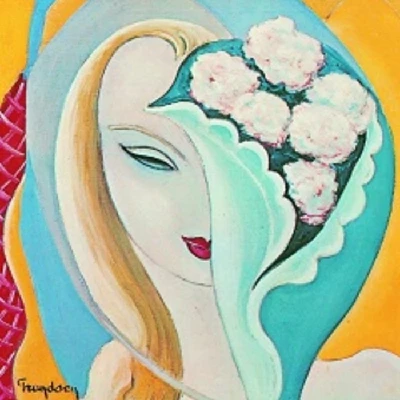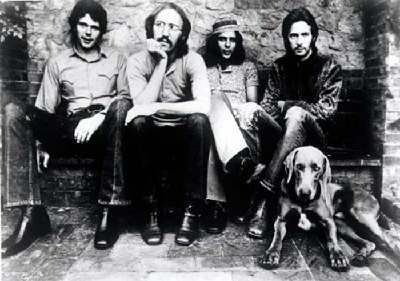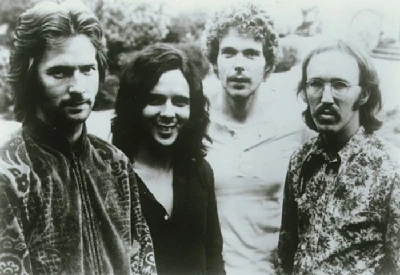published: 23 /
4 /
2011

In our Re:View section, in which our writers look back at albums from the past, Ben Howarth examines Eric Clapton's final band project Derek and the Dominos' only album, 'Layla and Other Assorted Love Songs', which has just been released in a fortieth anniversary edition
Article
‘Derek’ is Eric, of course.
As an up-and-coming blues guitarist, Eric Clapton was revered as a god by most mods and plenty of graffiti artists, but by 1970 his status was no longer unchallenged. A psyched-up Rolling Stones were in the middle of their most creatively fertile run, Hendrix’s inimitable approach had made Clapton look conventional and Jimmy Page was about to take blues-based guitar rock into stadiums with Led Zeppelin.
Clapton had seen Cream stumble and Blind Faith miss the starting gun, and seemed to have run out of ideas. His personal life was falling apart, as he had become obsessed with the wife of his best friend George Harrison and addicted to heroin, it would not be long before he took a lengthy exile from the music industry. Before the, he had time for one last burst of creativity. His first solo album was released in the summer of 1970 and, immediately afterwards, Clapton made his final album with a group.
And finally, after years of near-misses, Clapton made his defining statement. An album of vibrant rock music, easy on the pop fan’s ear, based around the time-honoured blues format he loved and embellished by his unmatched virtuosity. Unfortunately, he cracked it at precisely the point when many fans had given up on him.
Clapton’s earlier work had been technically impressive, his mastery of authentic blues was second-to-none. Yet, it was only ‘Layla and Other Assorted Love Songs’ that Clapton made music that sounded authentically his own. The difference? Genuine pain and tortured love. A time honoured theme, but one that sustains 77 minutes of music.
Though he hid these songs behind a pseudonym, both for himself and his subject, this is really an album of direct love letters from Clapton to Patti Boyd. The presence of the ‘Dominos’, who had come together as part of the epic sessions for George Harrison’s ‘All Things Must Pass’, and a walk-on part for Duane Allman turn Clapton’s harrowing songs into an album of big-hearted blues albums.
Hiding behind a quaint old fashioned rock ‘n’ roll band name, the choice of ‘Derek’ as the band-leader made it quite clear that in this venture there was no debate about who was in charge. Ironically, having set his stall out, Clapton allows the Dominos more space than he ever did with Cream. All but one of his songs are co-written, while organist Bobby Whitlock writes one song on his own and drummer Jim Gordon composed the famous extended piano coda to the title track.
The sleeve art (which, admittedly, with its lack of shots of Clapton shooting up, doesn’t tell the whole story) shows a bunch of long haired layabouts amiably mucking about with guitars in the studio. Clapton’s most personal album, far more so than the solo record he had just finished, emerges entirely as the work of a group. Possibly of equal importance, work on the album was done within a matter of weeks.
In one respect, it’s understandable that alternative music fans from punk onwards have written albums like this off. Just seven years after Eric Clapton was part of a burst of fabulously talented young musicians who invented an entirely new youth culture, he had joined an overly chummy rock aristocracy. Long having abandoned the musicians with whom he made his name, Clapton now hung out with George Harrison and formed ‘supergroups’ that rarely added up to more than the sum of their parts.
‘Why Does Love Got To Be So Sad?’ is the case for the defence. A furious burst of electric guitar brimming with effortless virtuosity, it comes with Clapton tearing out his vocal chords over a classic groove set down by Gordon and bassist Carl Radle. The Dominos paid tribute to Hendrix, who died while this album was being made, with a fantastic cover of ‘Little Wing’, but on this track Clapton makes up for the loss by matching the frantic rush of Hendrix’s first recordings with the Experience. Listeners will also notice that, albeit dramatically sped up, this track shares its tune with the album’s title track.
‘Layla’ itself has become something of a cliché over the years, the victim of over-exposure – Saga radio are no doubt cueing it up as you read this. But, in context, it stands proud as a remarkable piece of music – a cornerstone of 70's rock. That famous guitar riff bursts out of the speakers, as Clapton screams out for ‘Layla’. Those bits you’ll remember. But what makes this song so good is the interplay between Clapton’s irrepressible guitar and the incessant rhythm conjured by the rest of his band. And, of course, Jim Gordon’s piano coda is inspired, rare beauty that emphasises the pain and pleasure in Clapton’s unrequited emotions.
These assorted love songs arrived in the same year as George Harrison secured his only Beatles A-side with ‘Something’, his own equally passionate tribute to Patti Boyd. Clapton’s decision to cover Billy Myles’ ‘Have You Ever Loved A Women?’, which refers to the "shame and sin" of loving a woman that "belongs to your very best friend" is no coincidence. It might just be his best ever vocal performance.
Elsewhere, we are treated to the shuffle of album-opener ‘I Looked Away’, with the first of many references to "another man’s woman", the country-pop of ‘I Am Yours’, which might have fitted nicely on Paul McCartney’s home-made solo albums and the epic ten-minute blues of ‘Key To The Highway’, where Clapton shows off every one of his many tricks.
In 1970, there were small signs that fans were tiring a bit of pop’s 60s aristocracy, most of whose best work was behind them. ‘Layla and Other Assorted Love Songs’ was an unfortunate victim of this trend – it enjoyed neither critical approval or strong sales. It wasn’t until 1972 when the title-track became a mega-hit and classic rock staple, by which time Clapton had abandoned attempts at a second album and disappeared into exile.
He returned with an unfortunate fondness for bland balladry and an even more unfortunate fondness for the racism of Enoch Powell. For some that latter trait is a reason to dismiss his music completely, and I understand that. It might, however, be kinder to view his support for the ‘Rivers of Blood’ speech as a moment of madness from someone who clearly has no personal malice towards those of other races. And, if you can manage that, you are left with this astonishing album. If you only want to own one early 70's blues-rock epic, look beyond ‘Exile On Main Street’, and buy ‘Layla and Other Assorted Love Songs’.
Newcomers now have the chance to purchase this in a two-disk legacy edition format. If disappointingly lacking in any sleevenotes or background info that are surely a prerequisite in a legacy edition, it does come with selections from the aborted sessions for a second Dominos album.
Longstanding Claptomaniacs will have these on multiple bootlegs, of course, but for everyone else, they make this version of ‘Layla’ a one-stop-shop for Clapton’s most inspired work.
Track Listing:-
Picture Gallery:-

